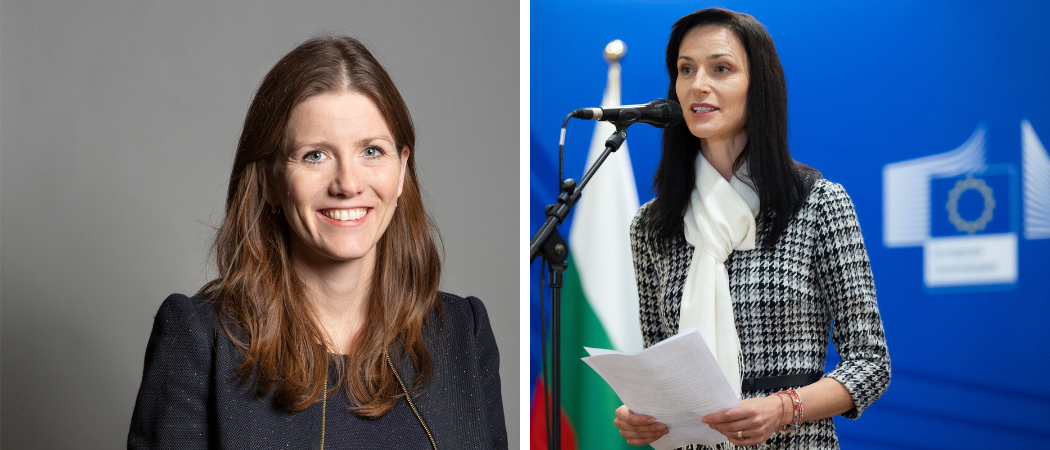UK science and technology minister Michelle Donelan is in Brussels today to meet EU research commissioner Mariya Gabriel and set the scene for upcoming association talks

UK state secretary for science and Technology Michelle Donelan (Left) is in Brussels today to meet EU research and innovation commissioner Mariya Gabriel (Right)
The UK will not be required to pay into Horizon Europe for the two years it was not associated to the programme the European Commission has confirmed, as the researchers hang on for a deal on post-Brexit cooperation in the €95.5 billion research programme.
A spokesman for the Commission said the EU has already informed the UK government it “would not be required to contribute for the period it wasn’t associated to the programme, that is, 2021-2022.”
However, the UK government remains adamant it will pull out of talks if the terms of association are not in the UK’s interest.
With the EU research and innovation commissioner Mariya Gabriel welcoming UK state secretary for science and Technology Michelle Donelan in Brussels today, the UK government said Donelan is set to demand that further talks on Horizon Europe “reflect the lasting impact of two years of delays to the UK’s association.”
“I’m Brussels today to ensure there is understanding of that on both sides, while taking forward these discussions in a constructive and respectful way,” Donelan said.
However, it remains unclear what those terms are, given the Commission has agreed in principle that the UK’s financial contribution will be reduced.
Speaking at a Science|Business event last week, Adam Jackson, director for international research and innovation at the UK Department for Science, Innovation and Technology, said details on the terms the UK is seeking will become clear over the coming weeks.
Last month, the BBC reported that the UK government could reconsider the scope of the association, limiting the deal to the collaborative research pillar in Horizon Europe. This could become a new sticking point in the bilateral talks.
But for German MEP and Horizon Europe rapporteur Christian Ehler, a potential reshaping the scope of UK association, which was agreed by the European Parliament as part of EU-UK trade and cooperation agreement (TCA), is not on the table at the moment.
“I have no indication that there are concerns about the scope of the UK association,” he said. “This was agreed in the TCA, this is what the Parliament gave its consent to, so I expect the scope to remain the same.”
The Windsor framework
Earlier this year, UK prime minister Rishi Sunak and Commission president Ursula von der Leyen signed the Windsor framework agreement, allowing Northern Ireland to remain in the EU single market, but easing the customs requirements on goods going into the province from Great Britain. That cleared the way for finalising UK’s association to Horizon Europe, which had been put on hold since 2021.
Before the signing of the Windsor agreement, the UK treasury took back £1.6 billion that had been allocated for payments into Horizon Europe for 2021 and 2022. The money was part of the £6.9 billion allocated to pay for the UK’s participation in the EU’s research and innovation programme up until 2025.
According to the Commission, while the Windsor agreement allows both sides to “deepen cooperation” in science, research and innovation, such cooperation should reflect the terms agreed under the TCA. “We are ready to start working on the UK’s association to certain EU programmes immediately,” the Commission spokesman said.
Ehler said the political majority supporting the Windsor agreement offers a stable base for a constructive relationship between the EU and the UK. “Under those circumstances, there are no reasons to delay the association of the UK anymore, so hopefully indeed this can be finalised soon,” he said.
Announcing Donelan’s visit to Brussels the UK government also said it will publish plans for a “bold alternative” to Horizon Europe in the coming days. These will provide “long-term certainty if we are unable to reach the right terms through discussions with the EU,” it said.
To mitigate losses incurred by the delay, the UK government has established a guarantee giving successful Horizon Europe applicants the full value of their missed EU funding. Last month, the guarantee was extended until June.
Growing impatience
Ehler recently convened EU and UK research groups at a private meeting in the European Parliament to gauge the willingness of both sides to conclude UK’s association to Horizon Europe and to urge the Commission and the UK government to get moving on the deal.
“Every week we wait, we waste hundreds of millions in calls that close without the full participation of UK partners,” said Ehler. “That has to end as soon as possible.”
The Commission does not yet have a timeline for when the association could be completed, but Ehler said the European Parliament is able to facilitate technical discussions. “I believe it is now crucially important that we align everyone on a technical level so that when the association is done, we can hit the ground running,” he said.
Greg Clark MP, chair of the science committee in the UK House of Commons recently called on the UK government to accelerate Horizon Europe negotiations, while research organisations and universities in the UK and EU continue to pressure decisionmakers in London and in Brussels to speed up the talks.
Editor's note: This article has been updated 7 April. The UK government had planned to pay £6.9 billion into Horizon Europe up until 2025. The total contribution of the UK for the full length of the EU research programme has been estimated around £15 billion.





 A unique international forum for public research organisations and companies to connect their external engagement with strategic interests around their R&D system.
A unique international forum for public research organisations and companies to connect their external engagement with strategic interests around their R&D system.